 Mentor and friend Greg Mitchell at TheNation.com is on vacation. While he is away, I am pinch-hitting and blogging WikiLeaks updates here. All the times are EST. You can contact me at kgosztola@hotmail.com with any news tips. Twitter username is @kgosztola. Also, if you are looking for something good to listen to, I encourage you to check out the catalog of podcasts posted here at WL Central from the "This Week in WikiLeaks" show I produce every week.
Mentor and friend Greg Mitchell at TheNation.com is on vacation. While he is away, I am pinch-hitting and blogging WikiLeaks updates here. All the times are EST. You can contact me at kgosztola@hotmail.com with any news tips. Twitter username is @kgosztola. Also, if you are looking for something good to listen to, I encourage you to check out the catalog of podcasts posted here at WL Central from the "This Week in WikiLeaks" show I produce every week.
11:10 PM Big ruling for Pharma whistleblowers: Court rules under the False Claims Act "a drug or device maker remains liable...even when a pharmacy or hospital was unaware that a kickback was made to a doctor to induce the sale of a product for which reimbursement was sought from Medicare and Medicaid." This has the potential to alter outcome of a number of whistleblower lawsuits.
11:00 PM Over 4,100 citizens sign petition urging the Department of Justice to drop its case against NSA whistleblower Thomas Drake
10:50 PM Historical WikiLeaks: Documents showing British government fears that French would launch "back door attack" being made available. The government files are from the Stuart period and include secret reports of espionage and treason.
 Friday 3rd June was Day 4 of the Irish Independent's Irish Wikileaks releases. (See roundups of Days Three, Two and One.) After three days of drive-by reportage on the Irish cables, during which - with exceptions - the documents were mined for unexceptional confidential opinions of Irish policians, The Independent finally broached the story for which Irish followers of Wikileaks news were waiting.
Friday 3rd June was Day 4 of the Irish Independent's Irish Wikileaks releases. (See roundups of Days Three, Two and One.) After three days of drive-by reportage on the Irish cables, during which - with exceptions - the documents were mined for unexceptional confidential opinions of Irish policians, The Independent finally broached the story for which Irish followers of Wikileaks news were waiting.
The paper was scooped by the national broadcaster, RTE, which ran on Thursday night a half-hour segment (starts at 14:50) during its investigatory feature, Prime Time, on the Wikileaks Shannon Airport cables (early cables for which were reported on by the Guardian, and analysed by WL Central here). The morning of Thursday, some of the cables dealt with by both outlets had been released on the Wikileaks website, and so it was possible to read them already.
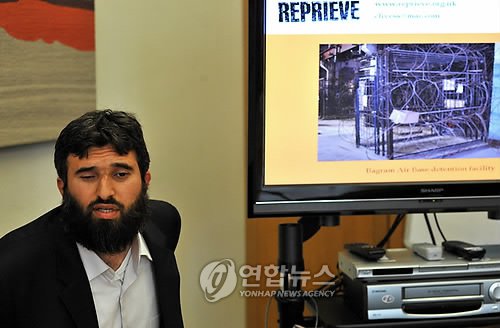 Authored by Alexa O'Brien and Heather Marsh.
Authored by Alexa O'Brien and Heather Marsh.
Omar Deghayes is a UK citizen who was imprisoned in Guantánamo in January 2002 and freed from there on December 18, 2007. Details of his treatment in Guantánamo can be read here. He speaks to PressTV about his experiences here.
Omar Khadr is a Canadian citizen who was captured at fifteen after the compound he was living in in Afghanistan was bombed by US military. He was tortured at Bagram prison and Guantánamo, and has spent the last nine years of his life imprisoned by the US. WL Central coverage on Omar Khadr is here.
Omar Deghayes spoke to WL Central's Alexa O'Brien on June 5. The following is an excerpt from that interview.
Did you have any contact with Omar Khadr?
OD: Yes definitely. I know him very well. He was locked up in Camp 5 for a long time, and I saw him in the other camp also before for a short period of time. But in Camp 5 I was locked up with him for a long time.
Do you think that Omar Khadr would be a threat to society if and when he is released to Canada?
OD: No. Definitely not. Even the guard and the interrogators in Guantanamo I think used to like him a lot ... for his personality. He is an open, kind person. I don't think he would be a threat to society. No.
 Mentor and friend Greg Mitchell at TheNation.com is on vacation. While he is away, I am pinch-hitting and blogging WikiLeaks updates here. All the times are EST. You can contact me at kgosztola@hotmail.com with any news tips. Twitter username is @kgosztola. Also, if you are looking for something good to listen to, I encourage you to check out the catalog of podcasts posted here at WL Central from the "This Week in WikiLeaks" show I produce every week.
Mentor and friend Greg Mitchell at TheNation.com is on vacation. While he is away, I am pinch-hitting and blogging WikiLeaks updates here. All the times are EST. You can contact me at kgosztola@hotmail.com with any news tips. Twitter username is @kgosztola. Also, if you are looking for something good to listen to, I encourage you to check out the catalog of podcasts posted here at WL Central from the "This Week in WikiLeaks" show I produce every week.
10:10 PM "This Week in WikiLeaks" podcast just up here at WL Central. Marcy Wheeler who blogs as Emptywheel at Firedoglake is the guest. I interview her on cyber security, whether the SIPR classified information database compromised supposedly by Bradley Manning has been secured by the Department of Defense or not, and national security journalism and the war on whistleblowing,
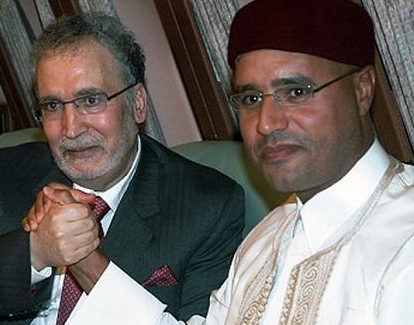 8:00 PM The second round of cables coverage from one of the latest WikiLeaks partners, The Scotsman, is up. They cover Megrahi's release, the Lockerbie Bomber. The revelation is Gaddafi wanted the release of the Lockerbie Bomber because he was upset about "the case of six Bulgarian nurses freed from a Libyan jail in 2007." Because he was upset, he wanted to give Megrahi a "hero's welcome," something Sen. John McCain didn't think would be good for relations.
8:00 PM The second round of cables coverage from one of the latest WikiLeaks partners, The Scotsman, is up. They cover Megrahi's release, the Lockerbie Bomber. The revelation is Gaddafi wanted the release of the Lockerbie Bomber because he was upset about "the case of six Bulgarian nurses freed from a Libyan jail in 2007." Because he was upset, he wanted to give Megrahi a "hero's welcome," something Sen. John McCain didn't think would be good for relations.
 As it becomes more and more clear the United States government is accelerating efforts to establish a policy and improve the government's ability to respond to cyber attacks, the openness and freedom of the Internet is more and more at stake. Also, specific to an organization like WikiLeaks, the government may be on its way to crafting legal authority to take WikiLeaks out with DDoS or DNS attacks. (Of course, many already believe the US was behind the attack on the WikiLeaks website that took place just as WikiLeaks was beginning to release the US State Embassy cables.)
As it becomes more and more clear the United States government is accelerating efforts to establish a policy and improve the government's ability to respond to cyber attacks, the openness and freedom of the Internet is more and more at stake. Also, specific to an organization like WikiLeaks, the government may be on its way to crafting legal authority to take WikiLeaks out with DDoS or DNS attacks. (Of course, many already believe the US was behind the attack on the WikiLeaks website that took place just as WikiLeaks was beginning to release the US State Embassy cables.)
 Marcy Wheeler, guest on the podcast this week, gets into this saying, "If you agree that bringing down speech is a legitimate cyber warfare tactic and if you agree that WikiLeaks was an attack on defense infrastructure or maybe State Department infrastructure, then you can easily get to the justification of okay we can do a DDOS attack on WikiLeaks," and finds the US government may be working to create legal justification for such attacks.
Marcy Wheeler, guest on the podcast this week, gets into this saying, "If you agree that bringing down speech is a legitimate cyber warfare tactic and if you agree that WikiLeaks was an attack on defense infrastructure or maybe State Department infrastructure, then you can easily get to the justification of okay we can do a DDOS attack on WikiLeaks," and finds the US government may be working to create legal justification for such attacks.
Wheeler blogs at Firedoglake as Emptywheel. She primarily covers the national security establishment in the United States and has written many blog posts on WikiLeaks, Bradley Manning and cyber security, with her most recent post on all of this being, "The Cyberwar Campaign against Jihadi Literature and WikiLeaks."
The popular Indian yoga guru Baba Ramdev went on a hunger strike June 4, 2011 to protest corruption in India. Thousands of supporters gathered in Delhi and other locations around the country to join the protest.
The police cracked down on the protest using tear gas shells upon the crowd after protesters apparently threw rocks at them. Ramdev was taken into custody and detained in Delhi and then taken to Haridwar. This comes after the government pleaded with Ramdev to end the hunger strike which is set to continue to the death until the popular Swami's demands were met.
The swami has demanded:
Similar hunger strikes took place in a number of cities all across India, including Orissa and Mumbai.
This is coming amid the heated debate over the Lokpal bill, in which members of the Civil Society threatened to walk out of the discussions if their demands were not met. Primarily at issue, is for the PM and other high level officials to be included in the purview of the law which seeks to deal with the black money issue.
The current Prime Minister Manmohan Singh has grown increasingly unpopular because of corruption, the Commonwealth Games problems in 2010 and the telecoms scandal.
The following is a press release from World Can't Wait, which helped to organize the rally for Bradley Manning in Times Square in New York City today.
NEW YORK — 100 supporters of PFC Bradley Manning converged today (Saturday, June 4, 2011) at Times Square while hundreds of others rallied at Ft. Leavenworth, KS for the soldier who stands accused of leaking classified government information to WikiLeaks and ultimately to the public.
Supporters held posters saying “Free Bradley Manning” and gathered around large anti-war banners near the Times Square military recruiting station, and coincidentally, near an action in support of marriage equality.
This was the first rally for Bradley Manning since he was transferred to Fort Leavenworth on April 20, 2011, after having suffered under extreme and unusual confinement conditions at US Marine Corps Base Quantico, Virginia. During the nine months at Quantico, Manning was denied meaningful exercise, social interaction, and sunlight, and was at times kept completely naked. A number of those present at the rally are still facing trespass charges for lying in the road in front of the Quantico base on March 20, 2011, in an action that is believed to have spurred Manning’s transfer
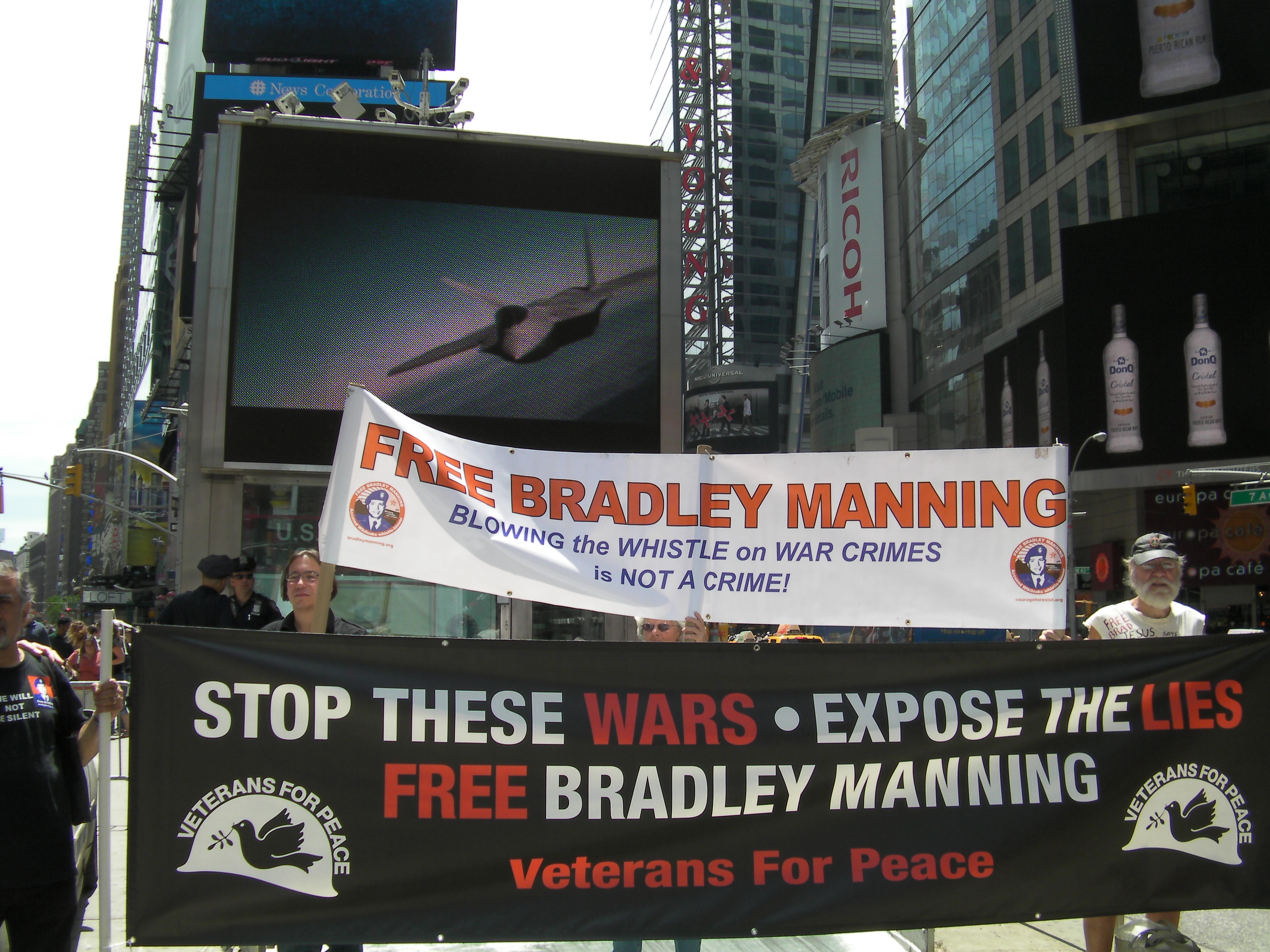
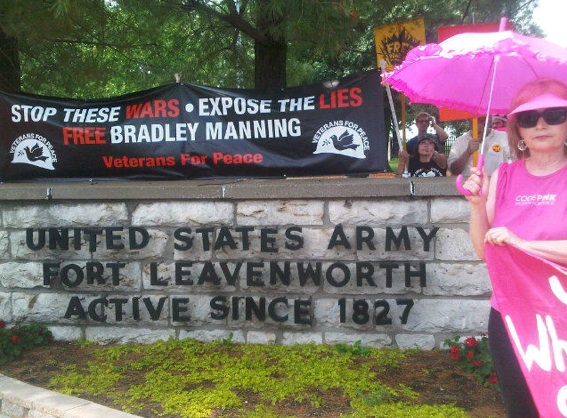 The following is a press release from the Bradley Manning Support Network on the rally just held at Ft. Leavenworth in Kansas.
The following is a press release from the Bradley Manning Support Network on the rally just held at Ft. Leavenworth in Kansas.
LEAVENWORTH, KS — Approximately 250 supporters of PFC Bradley Manning—including many United States military veterans—converged today (Saturday, June 4, 2011) at Fort Leavenworth, Kansas to rally for the soldier who stands accused of leaking classified government information to WikiLeaks and ultimately to the public.
Supporters held large colorful signs that said, "Free Bradley Manning, Hero, Whistle-Blower." They gathered at Bob Dougherty Memorial Park where they staged a rally with speakers and music for one hour. Then they marched several blocks to the main entrance of Fort Leavenworth, where PFC Manning is being held. Rally speakers called on the Obama Administration to protect whistle-blowers and to drop all charges against the Army private.
This was the first large public rally to support PFC Bradley Manning since he was transferred to Fort Leavenworth. He was transferred on April 20, 2011, after having suffered under extreme and unusual confinement conditions at US Marine Corps Base Quantico, Virginia. During the nine months at Quantico, Manning was denied meaningful exercise, social interaction, and sunlight, and was at times kept completely naked.
The Bradley Manning Support Network worked with other local and national groups to organize the rally. Members from two veterans' organizations—Veterans For Peace and Iraq Veterans Against the War—comprised a large part of the turnout, including a contingent that drove from Fort Hood, Texas.
 Dueling resolutions from Republican Speaker of the House John Boehner and Democratic House Representative Dennis Kucinich sparked a debate in Congress. The debate centered around the War Powers Act, the US Constitution and whether President Obama had violated the law by taking the United States into a war in Libya.
Dueling resolutions from Republican Speaker of the House John Boehner and Democratic House Representative Dennis Kucinich sparked a debate in Congress. The debate centered around the War Powers Act, the US Constitution and whether President Obama had violated the law by taking the United States into a war in Libya.
The Kucinich Resolution (H.R. Con. Res. 251) aimed to direct the president, pursuant to the War Powers Act, to remove all troops from Libya within fifteen days after the resolution was adopted. It was an attempt to force Congress to exercise the authority that it has under the Constitution to decide when and where troops are deployed for wars and whether or not wars should be launched.
In contrast, the Boehner Resolution (H.R. Con. Res. 292) was offered by Speaker Boehner to take the wind out of the sails of the growing bipartisan movement, consisting of anti-war Democrats and anti-interventionist Republicans, who were ready to assert Congress’ legislative authority and oppose the further expansion of the Executive by the Obama Administration that has taken place as a result of the Libya War.
The resolution brought by Rep. Kucinich failed 148-265. Speaker Boehner’s resolution passed 268-145.
On the 30th of March, Polish daily newspaper Gazeta Wyborcza published a fateful article that ultimately led to a criminal investigation. It detailed a document commissioned by Warsaw prosecutor Jerzy Mierzewski, who was then in charge of the investigation into alleged US detention facilities on Polish soil. He had asked external experts for advice on a variety of legal matters. After the external evaluation arrived, Mierzewski was removed from the investigation. Gazeta Wyborcza obtained the 50 page document by unknown means and published extracts from it. As a consequence of this publication, the newspaper itself became the focus of a criminal investigation.
This move came shortly after lawyers acting on behalf of a Guantanamo detainee filed a complaint against Poland at the European Court of Human Rights, and shortly before President Obama's visit to Poland.
According to the Gazeta Wyborcza article, Mierzewski had planned to file charges of breach of the constitution, false imprisonment and assistance in crimes against humanity, and had asked for advice, amongst other things, on the following matters:
- Does international law cover the operations of detention centers for people who are suspected of being terrorists?
- Does the legal framework of a country in which such a detention center exists have the power to shut it down?
- Does a confession that a person - who has been suspected of terrorist activity and has been detained - is a member of al Qaida have any influence on their legal status?
- What does it mean for the legal status of this person that he is detained outside a battlefield or an occupied area?
He received the following answers:
- There is no legal framework allowing foreign agencies to open any facilities in Poland which are beyond our control.
 Mentor and friend Greg Mitchell at TheNation.com is on vacation. While he is away, I will be pinch-hitting and blogging WikiLeaks updates here. All the times are EST. You can contact me at kgosztola@hotmail.com with any news tips. Twitter username is @kgosztola. Also, if you are looking for something good to listen to, I encourage you to check out the catalog of podcasts posted here at WL Central from the "This Week in WikiLeaks" show I produce every week.
Mentor and friend Greg Mitchell at TheNation.com is on vacation. While he is away, I will be pinch-hitting and blogging WikiLeaks updates here. All the times are EST. You can contact me at kgosztola@hotmail.com with any news tips. Twitter username is @kgosztola. Also, if you are looking for something good to listen to, I encourage you to check out the catalog of podcasts posted here at WL Central from the "This Week in WikiLeaks" show I produce every week.
11:40 PM Operation Recovery will be at Leavenworth tomorrow to support Bradley Manning
Republished in full, here's the statement from William Stewart-Starks, leader of the Kansas City chapter of IVAW, on why Iraq Veterans Against the War will be supporting Manning this weekend:
This Saturday many will gather in Leavenworth, Kansas to call for the release of PFC Bradley Manning. In the past few months a broad based coalition of peace and civil liberties activist have come together in cooperation to demand that his indefinite detention by the whim of the military will finally cease. It is important for IVAW and its members to understand the implications and precedent his case has had in regards to turning back further GI rights across the board.
 Thursday 03 June was Day Three of the Irish Independent's Cablegate coverage. The day's main focus was the Irish financial crisis. The Independent also explored what is revealed about corporate Ireland in the cables. While there is a distinct sense that various of the stories are only news insofar as they reveal American attitudes to familiar Irish events, some new information was introduced on some of the key moments of recent Irish history.
Thursday 03 June was Day Three of the Irish Independent's Cablegate coverage. The day's main focus was the Irish financial crisis. The Independent also explored what is revealed about corporate Ireland in the cables. While there is a distinct sense that various of the stories are only news insofar as they reveal American attitudes to familiar Irish events, some new information was introduced on some of the key moments of recent Irish history.
The Independent has chosen to continue summarizing the cables without citation or reproduction of the original material, such that the criticisms from the overviews on Day Two and Day One apply equally here.
Online Articles
The following are the articles the Independent made available on its website.
Revealed: total chaos in coalition as economy collapsed
BY SHANE DORAN AND BRENDAN KEENAN
THE scale of the economic collapse left Brian Cowen’s cabinet totally paralysed as the Government found it "almost impossible" to come up with a rescue plan, according to leaked US Embassy cables.
Top diplomat bemused by 'turned the corner' speech
BY SHANE PHELAN, INVESTIGATIVE CORRESPONDENT
AMERICA'S top diplomat in Ireland was left bemused by Brian Lenihan's infamous "we have turned a corner" budget speech, a leaked US embassy cable reveals.
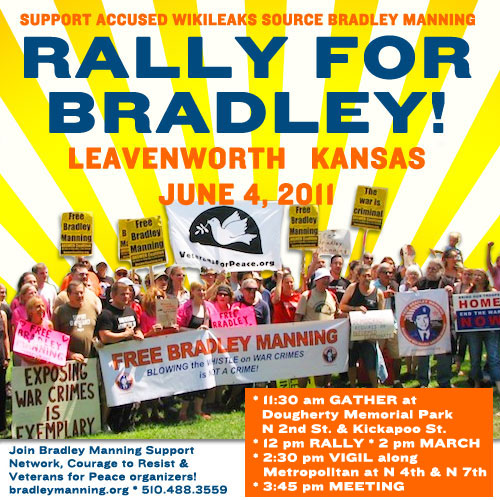 The Bradley Manning Support Network will be having a rally to support Bradley Manning at Leavenworth tomorrow.
The Bradley Manning Support Network will be having a rally to support Bradley Manning at Leavenworth tomorrow.
I interviewed Jeff Paterson, who is with Courage to Resist and serves on the Bradley Manning Support Network Steering Committee.
You can listen to the interview by clicking on the embedded player:
Paterson discusses Manning's transfer to Leavenworth saying it "came about only because more than a half million people took action" through protests, letters, singing songs directly to the president etc. And, it was a victory that ended the "torturous conditions" he was being subjected to at Quantico.
Paterson also deconstructs recent portrayals of Manning in films produced by PBS and The Guardian.
Prosecutors in the Northern Polish city of Gdansk have opened an investigation into the leaking of documents to Gazeta Wyborcza, effectively confirming their authenticity. These documents revealed that Jerzy Mierzewski, a Warsaw prosecutor, had planned to file charges of breach of the constitution, false imprisonment and assistance in crimes against humanity in a case surrounding alleged CIA detention and torture facilities in Stare Kiejkuty and rendition flights to and from Szymany airport in Masuria.
Former Polish PM Leszek Miller, who had been named as one of the persons authorizing a cooperation with the CIA by former MEP Józef Pinior, criticized the publication, calling journalists "useful idiots" who "invited al Qaida into the country".
The investigation is carried out in Gdansk (rather than in Warsaw), because it also concerns the dealings of Warsaw prosecutors.
The decision to remove Mierzewski from the case came shortly after lawyers acting for a Guantanamo detainee filed a complaint against Poland at the European Court of Human Rights, and shortly before President Obama visited the country.
For background reading please see this post, which also contains links to a Council of Europe investigation into the role of Poland in CIA rendition flights and international press coverage:
http://wlcentral.org/node/1849
For other WL Central coverage on the topic please see here.
 Mentor and friend Greg Mitchell at TheNation.com is on vacation. I'm no Greg Mitchell so I cannot promise to bring the flourish to blogging WikiLeaks News & Views that he brought for 185 days. However, I am Kevin Gosztola, someone very enthusiastic and passionate about staying up to date on the cable releases and all news and discussion surrounding the WikiLeaks organization. While he is away, I will be blogging WikiLeaks updates here.
Mentor and friend Greg Mitchell at TheNation.com is on vacation. I'm no Greg Mitchell so I cannot promise to bring the flourish to blogging WikiLeaks News & Views that he brought for 185 days. However, I am Kevin Gosztola, someone very enthusiastic and passionate about staying up to date on the cable releases and all news and discussion surrounding the WikiLeaks organization. While he is away, I will be blogging WikiLeaks updates here.
You can contact me at kgosztola@hotmail.com with any news tips. Also, my Twitter username is @kgosztola.
11:00 PM USA Today, in their portrait of Dominique Strauss-Kahn, use WikiLeaks cables to illuminate his political history as a Socialist.
9:55 PM Another indication of how useful the US State Embassy cables are to US media: Los Angeles Times cites Yemen cables in its coverage of violence erupting in Yemen
 This post is a roundup of reports on the Irish Cables by the Irish Independent. For Day One, see here.
This post is a roundup of reports on the Irish Cables by the Irish Independent. For Day One, see here.
In a commendable move, Day Two of the Ireland Cables has for the most part been made available on the Irish Independent's website. This marks a turnaround on yesterday's coverage, which was only available in the print edition, limiting the audience to those in Ireland.
The coverage for the day was dominated by a frontpage story announcing that "The Ireland Cables reveal how the Americans view our political elite." Inside, on pages 26-27 and 30-31, we were given a selection of pull-out quotes from the cables, where each of the documents was whittled down to a few words describing some or other Irish politician. No context was given. Two other stories ran over what the cables had to say about Bertie Aherne (ex-Fianna Fail Taoiseach) and Brian Cowen (his successor as Fianna Fail's head and Taoiseach until February this year).
 Mentor and friend Greg Mitchell at TheNation.com is going to be on vacation. I'm no Greg Mitchell so I cannot promise to bring the flourish to blogging WikiLeaks News & Views that he has brought for 185 days. However, I am Kevin Gosztola, someone who is very enthusiastic and passionate about staying up to date on the cable releases and all news and discussion surrounding the WikiLeaks organization and, while he is away, I will be blogging WikiLeaks updates here.
Mentor and friend Greg Mitchell at TheNation.com is going to be on vacation. I'm no Greg Mitchell so I cannot promise to bring the flourish to blogging WikiLeaks News & Views that he has brought for 185 days. However, I am Kevin Gosztola, someone who is very enthusiastic and passionate about staying up to date on the cable releases and all news and discussion surrounding the WikiLeaks organization and, while he is away, I will be blogging WikiLeaks updates here.
You can contact me at kgosztola@hotmail.com with any tips. Also, my Twitter username is @kgosztola.
8:50 PM In Canada, it's easy to get on the no-fly list but much harder to be taken off. The Globe and Mail covers the story of "Ali" who appeared in a Ottawa cable released last month. The cable notes that in January 2010 Canadian police spotted "Ali" on Highway 41 and beside him was a "gawky Iranian-Canadian in his 20s." His companion was under surveillance "as the No. 1 terrorism suspect in Canada."
The article notes that once intelligence is passed "south - and they insist they must do so - they have little influence on what follows." A shared security perimeter with the US has been setup so there will likely be more incidents like this in the future.
According to Gazeta Wyborcza, Jerzy Mierzewski, the prosecutor investigating alleged CIA prisons on Polish territory, was removed from the case because he had planned to file charges of breach of the constitution, false imprisonment and assistance in crimes against humanity.
This move came shortly after a lawyer acting for a Guantanamo detainee filed a complaint against Poland at the European Court of Human Rights, and a week before President Obama's visit to Poland.
Recent days have seen a number of articles on alleged CIA rendition flights and prisons on Polish territory in the Polish press. These were also prompted by a statement former MEP Józef Pinior made to Gazeta Wyborcza, saying that there is a memorandum signed by former PM Leszek Miller regulating the operations of a planned CIA prison on Polish territory. Miller strongly denies this.
For other WL Central coverage on the topic please see here.
 Background
Background
After months during which the Irish media appeared to display little interest in the content of the State Department cables held by Wikileaks, The Irish Independent has finally initiated publication as part of a Wikileaks partnership. This is the first and hitherto only Wikileaks partnership in the Irish media. Today was Day One, and the coverage is projected to run for at least a week, although the Independent may choose to use its access to the cables for longer than this. Tomorrow's cables are to be on "What the US really thinks of [Irish] politicians." Investigative correspondent for the Independent, Shane Phelan, announced tonight on Vincent Browne Tonight that Thursday's reports will be on what the cables reveal about Ireland's banking crisis and recent economic troubles.
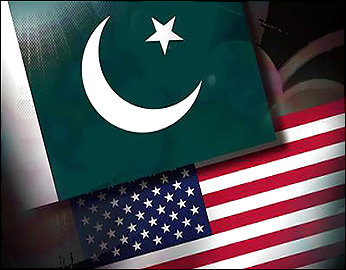 The Dawn Media Group in partnership with WikiLeaks has been releasing the "Pakistan Papers." Thus far, some of the revelations include the following: US was concerned that Pakistan would oppose its policies at the United Nations; US was worried Pakistan would purchase oil from Iran, allowing them to get a foothold in Pakistan; Pakistan's government was upset with US funding for the Pakistan military, which led to increased civil-military tensions; Pakistan's military asked for continued drone coverage; the US has had troops deployed on Pakistan soil; Saudi Arabia and the UAE have been financing jihadist groups in Pakistan and the US did not provide Benazir Bhutto with proper security.
The Dawn Media Group in partnership with WikiLeaks has been releasing the "Pakistan Papers." Thus far, some of the revelations include the following: US was concerned that Pakistan would oppose its policies at the United Nations; US was worried Pakistan would purchase oil from Iran, allowing them to get a foothold in Pakistan; Pakistan's government was upset with US funding for the Pakistan military, which led to increased civil-military tensions; Pakistan's military asked for continued drone coverage; the US has had troops deployed on Pakistan soil; Saudi Arabia and the UAE have been financing jihadist groups in Pakistan and the US did not provide Benazir Bhutto with proper security.
For this episode of "This Week in WikiLeaks," the show has part two of an interview that was done with Raza Rumi, a writer based in Lahore, Pakistan. Rumi regularly writes for the Pakistani weekly The Friday Times, The News and Daily DAWN on myriad topics such as history, arts, literature and society. Rumi has worked in Pakistan and abroad in various organizations including multilateral institutions such as the United Nations.
Rumi's writing can be read here.
[*Note: This is the second part of "This Week in WikiLeaks" for the week. You'll find part one, an interview with Kevin Zeese of the Bradley Manning Support Network on the one year anniversary of Manning's arrest here.]
To hear the show, click play on this embedded player.
Theme by Danetsoft and Danang Probo Sayekti inspired by Maksimer